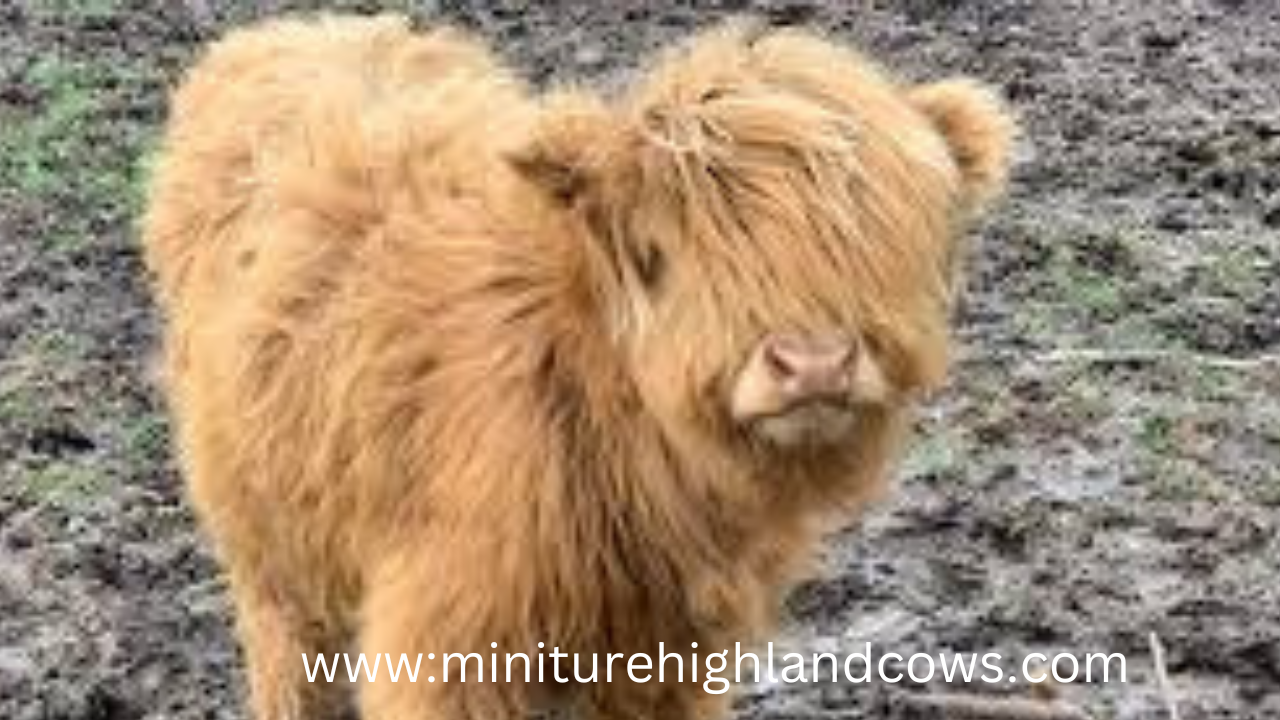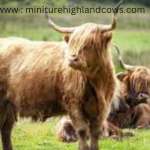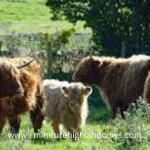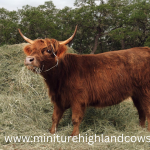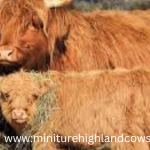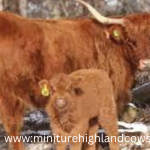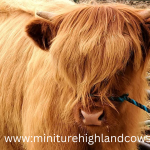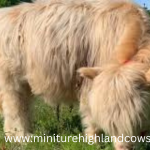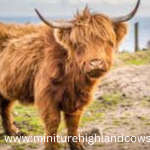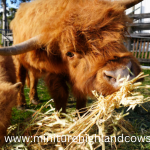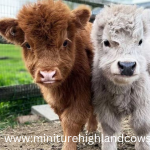Miniature West Highland cows, or “mini Highland cows,” are simply a downsized version of the original Highland cattle, which were first bred in the rugged Scottish Highlands. In miniature version, they retain the iconic long horns, thick fluffy double coat, and friendly disposition of their full-sized relatives but arrive in a more manageable size. Mini Highland cows are growing in popularity, mostly among hobby farmers, homesteaders, and even families with sufficient space to raise them as unique pets.
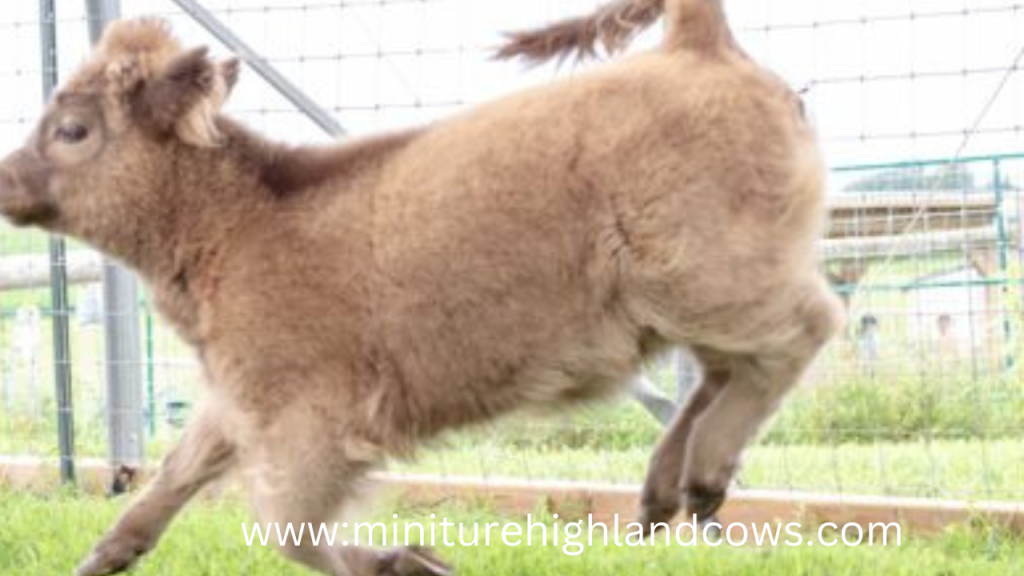
Micro mini Highland cow
Smaller than the mini Highland cattle, a micro mini Highland cow is ideal for people who like the charm of Highland cows but need an even smaller size. All the characteristics of these smaller cousins, such as their thick, fluffy coat and long horns, are retained, but significantly smaller, thus making this perfect for those who have smaller properties or perhaps unique pets.
Main characteristics and size
Fully grown, micro mini Highland cattle usually reach shoulder height below 36 inches. They are thus more compact than miniature Highland cows and traditional Highland cattle. Their size is therefore beneficial to small farms, hobby farms, petting zoos, or even small private houses with some land. Micro minis, however retain that iconic fluffy coat and those impressive horns, thus bringing drama to their surroundings, irrespective of the surrounding environment.
Temperament and Personality
One of its characteristic features is that the micro mini Highland cow is quite friendly and gentle. These cows are just the social and affectionate animals who enjoy human interaction, aren’t they? They usually are rather peaceful and docile, so you can handle them much easier compared to bigger breeds of cattle. Their friendly and curious nature entails being on an almost pet-like basis with the owners and not on the farm-accordance basis.
This makes them easy to put in homes with children because their size, and even calm nature, allows the livestock not to easily scare either and control the cattle more easily compared to full-sized cows.
Care and Maintenance
Although small, micro mini Highland cows still require proper care and attention. They will have very thick, shaggy coats that protect them well in cold weather but in warmer climates can cause overheating. They need to be groomed regularly, especially during the warmer months, to prevent mats and look after the health of their coat.
Since they are still cattle, they require room to graze and roam. On average, a micro mini cow will take about half an acre of pasture. They primarily consume grass and hay; they would also appreciate grain or mineral supplements in smaller amounts. They require access to water, shade, and shelter.
Popularity and Appeal
Micro mini Highland cows are increasingly being kept as pets by hobby farmers. They come on social media because of their beautiful looks and sweet nature; this popularity well maybe the cause that is making it famous. Their size is manageable, therefore these cows are fast gaining popularity among people who would like to own a bit of Highland cattle magic in miniature form but really do not have space or resources required for the proper keeping of large Highland cattle.
With their shaggy coats, expressive face, and playful behavior, they are very photogenic subjects, and many owners share their adventures online.
Things to Consider Before Bringing One Home
Although micro mini Highland cows are smaller and easier to care for in general than full-sized cattle, they still do not escape the fact that these animals still require proper care and attention. They should have proper shelter, have a safe and spacious area to graze on, and proper veterinary care. Besides all of this, being social animals, they should be kept in pairs or groups to avoid loneliness that would lead to stress or behavioral disorders.
smallest cow breed
Smaller than the mini Highland cattle, a micro mini Highland cow is ideal for people who like the charm of Highland cows but need an even smaller size. All the characteristics of these smaller cousins, such as their thick, fluffy coat and long horns, are retained, but significantly smaller, thus making this perfect for those who have smaller properties or perhaps unique pets.
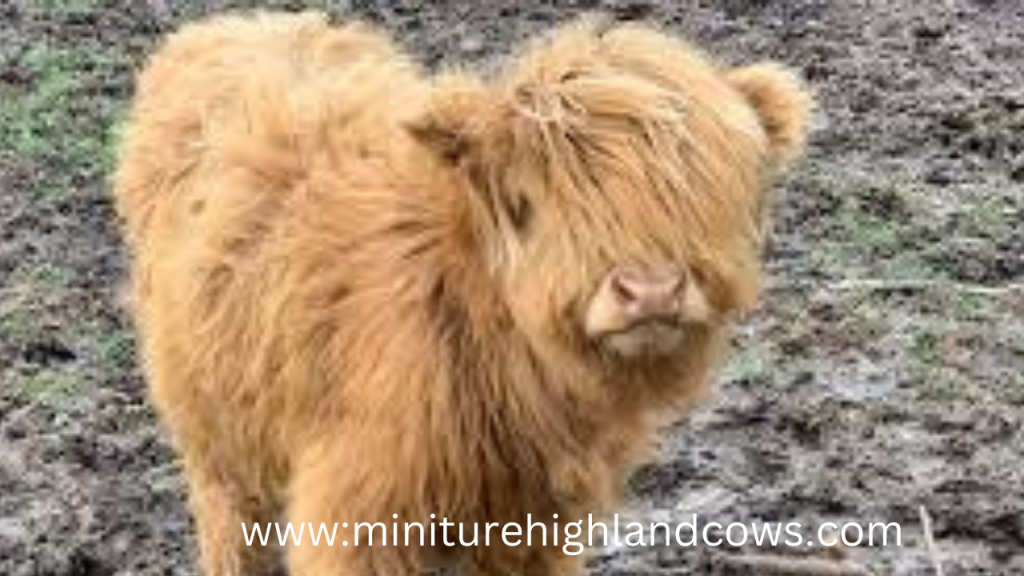
Main characteristics and size
Fully grown, micro mini Highland cattle usually reach shoulder height below 36 inches. They are thus more compact than miniature Highland cows and traditional Highland cattle. Their size is therefore beneficial to small farms, hobby farms, petting zoos, or even small private houses with some land. Micro minis, however retain that iconic fluffy coat and those impressive horns, thus bringing drama to their surroundings, irrespective of the surrounding environment.
Temperament and Personality
One of its characteristic features is that the micro mini Highland cow is quite friendly and gentle. These cows are just the social and affectionate animals who enjoy human interaction, aren’t they? They usually are rather peaceful and docile, so you can handle them much easier compared to bigger breeds of cattle. Their friendly and curious nature entails being on an almost pet-like basis with the owners and not on the farm-accordance basis.
This makes them easy to put in homes with children because their size, and even calm nature, allows the livestock not to easily scare either and control the cattle more easily compared to full-sized cows.
Care and Maintenance
Although small, micro mini Highland cows still require proper care and attention. They will have very thick, shaggy coats that protect them well in cold weather but in warmer climates can cause overheating. They need to be groomed regularly, especially during the warmer months, to prevent mats and look after the health of their coat.
Since they are still cattle, they require room to graze and roam. On average, a micro mini cow will take about half an acre of pasture. They primarily consume grass and hay; they would also appreciate grain or mineral supplements in smaller amounts. They require access to water, shade, and shelter.
Popularity and Appeal
Micro mini Highland cows are increasingly being kept as pets by hobby farmers. They come on social media because of their beautiful looks and sweet nature; this popularity well maybe the cause that is making it famous. Their size is manageable, therefore these cows are fast gaining popularity among people who would like to own a bit of Highland cattle magic in miniature form but really do not have space or resources required for the proper keeping of large Highland cattle.
With their shaggy coats, expressive face, and playful behavior, they are very photogenic subjects, and many owners share their adventures online.
Things to Consider Before Bringing One Home
Although micro mini Highland cows are smaller and easier to care for in general than full-sized cattle, they still do not escape the fact that these animals still require proper care and attention. They should have proper shelter, have a safe and spacious area to graze on, and proper veterinary care. Besides all of this, being social animals, they should be kept in pairs or groups to avoid loneliness that would lead to stress or behavioral disorders
Traits and Height
Mini Highland cows are between 36-42 inches tall at the shoulder. That is nearly half the height of a standard-sized Highland cow, and they usually measure out about 48 inches in height. This size makes them easier to manage and requires less space and feeds. True though they are small, they still resemble the full-sized Highlands in their strength and resistance, given the fact that they were first bred to thrive amidst the scarse climate of the Scottish Highlands. They are also compact in size; therefore, less intimidating to new handlers; they fit well into smaller pastures, so they’re perfect for even the smallest farms or properties.
Temperament and Social Nature
One of the beloved features of miniature Highland cows is its friendly temperament, calm and gentle. Known to be docile and almost affectionate, they are usually placid around humans. Therefore, mini Highlanders form an excellent choice for those who wish to keep interactive, sociable farm animals. Many mini Highland owners have noted that their cows love to be stroked and even brushed. When treated with care, they could bond to their caregivers. They are usually laid back and fit for farms with children or pets, if they are taken care of and treated with respect.
Care and Maintenance
Mini Highland cows are relatively low maintenance; they are used in so many climates, which range from cold winters to warm places. Their double coat made thick is natural, keeping them insulated from the cold and the harsh weather, hence they survive pretty well in cold areas. The coat itself, in colours such as black, red, yellow, and white adds to their characteristic and endearing look. They require grooming though-those kept in warmer climates need to be brushed often for to prevent overheating and a general cleaning of their coat. They eat a simple and relatively inexpensive diet consisting mainly of grasses and hay. Like most other cattle, they also require fresh water and supplemented minerals in order to survive. Also, because they are smaller, their own food requirements are more manageable than that of the standard-sized cattle, making them ideal for farms.
Popularity and Appeal
Mini Highland cows have gained many hearts as these creatures bring manageable size and low upkeep and unmistakably cute appearance. Their look is undeniably distinctive: it is full of shaggy coats, long eyes, and horns. They rank among favorites for petting farms, posts on social media, and for people who want an unusual pet. All of the charms of traditional Highland cattle are brought into smaller packages, and the friendly nature makes it enjoyable to have them present on any property.
Considerations of Potential Owners
Mini Highland cows do not really need so much care as the bigger-sized cattle does; however, they still would need some space, providing shelter, and proper care.
Owners should provide at least an acre of pasture per cow, appropriate fencing, and protection from extreme weather conditions. Proper veterinary care is also essential for proper health, though these cattle are smaller in size and can be prone to health issues similar to those affecting their larger relatives. But for a person willing to meet those needs, mini Highland cows can be a delightful and rewarding addition to one’s farm or home. In summary, the miniature Highland cow brings in all the beauty, resilience, and charm of the full-sized breed into a smaller and more manageable form. No matter whether kept for companionship, part of a small farm, or simply to add that touch of rural charm to landscape miniatures offer a unique and highly enjoyable experience for those with enough space and commitment to care for them.
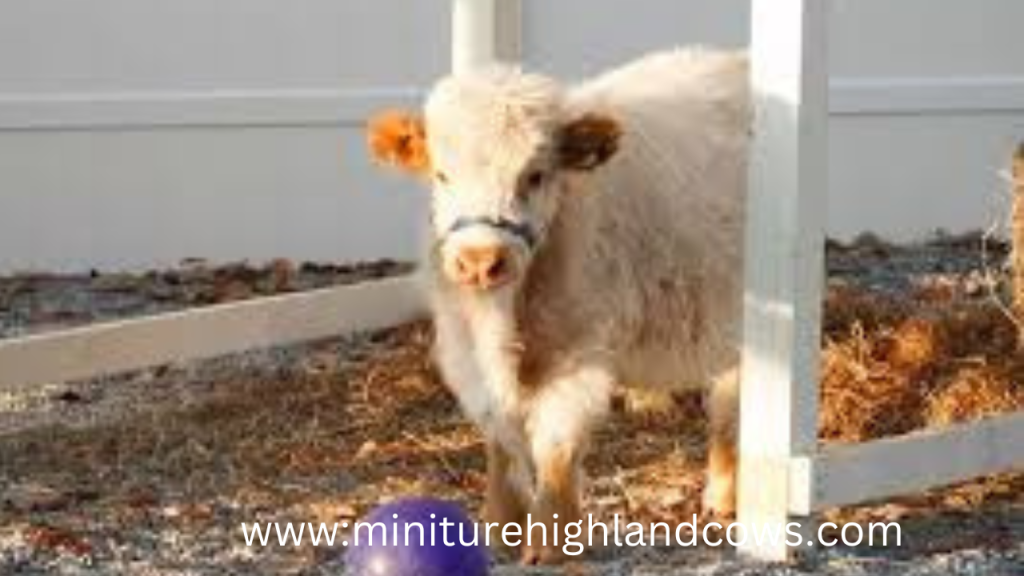
Frequently Asked Questions (FAQs) about Miniature West Highland Cows
1. **What is a Miniature West Highland Cow?
A Miniature West Highland Cow refers to the smaller-sized version of the authentic and well-known West Highland cows, having the same prominent features as its counterpart, like its fluffy shaggy coat, long horns, and friendly nature but in a more compact size. It is often used on smaller farms, hobby farming, or as an unusual pet.
2. How big do Miniature West Highland Cows get?
Miniature West Highland Cows are mature and fully grown in a shoulder height of 36-42 inches. They are therefore much smaller compared to the regular Highland cattle, which may stand about 4-5 feet tall at the shoulder.
3. **Are Miniature West Highland Cows suitable for small farms?
Yes! Miniature West Highland Cows make fantastic small farms, hobby farms, or even wider residential properties that can accommodate space. Being of smaller size, they are definitely easier to handle and consume less space as well as feed compared to standard-sized cattle.
4. What is the temperament of a Miniature West Highland Cow?
West Highland Cows are very friendly, gentle, and attached. It is a very social creature that requires lots of association with humans and other animals. Therefore, they are perfect for family, petting zoos, and small farms. Since they are rather calm, it is not difficult to handle them.
5. **Do Miniature West Highland Cows need special care?
Although they are sturdy animals that can accommodate many climates, Miniature West Highland Cows are not an exception to any set of needs and demands. They do require proper shelter, routine grooming-their heavy coat requires grooming regularly, adequate grazing area, and unfrozen water.
They possess thick coats, so in warmer climates they might need help with cooling down during warmer months of the year.
6. What does a Miniature West Highland Cow eat?
Miniature West Highland Cows are primarily grass grazers and hay eaters, but they might need some minerals or grains added to their diet. Similar to every cattle breed, they also require access to fresh water and acres of open space in which to run and graze.
7. Do Miniature West Highland Cows thrive in hot climates?
Miniature West Highland Cows have a thick double coat that keeps them warm and protected from cold weather but can sometimes get a bit overstressed in hot countries. Adequate brushing of their excess hair and shade with water supply will be big helps to keep them comfortable when the sun is burning.
8. **Can Miniature West Highland Cows be a pet?
Yes, these being gentle and friendly, it may not be difficult to raise such pets, and they are ideal pets for homesteaders who have enough land to support them; they get attached to their caretakers, but they can be very affectionate, so they make ideal pets for people looking for something a bit different while still suitable for a family.
Each miniature West Highland cow requires almost half an acre of grazing area. However, they may require larger pasture areas if kept in groups more than a few or if pasture is not of high food values. They need proper fencing and a shelter to keep them safe and warm.
10. What are the lifespans of miniature West Highland Cow?
The lifespan of a Miniature West Highland Cow normally averages between 12 to 15 years. They tend to live longer, especially when kept in a healthy environment with regular check-ups on veterinary advice.
A Miniature West Highland Cow costs varies in dependences such as age, lineage, and location among others. On average, it stands between $2,000 to $5,000 for a well-bred miniature. Other running costs associated with having one include food, shelter, and healthcare.
12. **Can Miniature West Highland Cows be used for milk production?
A Miniature West Highland Cow, like its standard counterparts, can be milked, though their yield is much less than that of standard dairy breeds. Sufficient milk to drink or to use on a small scale should result from milking a Miniature West Highland Cow. The flavor of the milk is good, though their yields are smaller.
13. **Can I keep a Miniature West Highland Cow with other animals?”
Yes, Miniature West Highland Cows are social animals and quite forgiving of other animals including sheep, goats, and other livestock. However, they must be given sufficient space and resources, and how to prevent them from accessing the same food and shelter may prove challenging.
14. **Are there any potential health issues with Miniature West Highland Cows?
Miniature West Highland Cows are generally a robust breed with minimum health issues. Like all other cattle, however, they are not immuned from hoof care, parasite control, or weight management problems. Any health disorder is best prevented with regular veterinary visits and proper care.
#
Miniature West Highland cows are a beautiful option for those who enjoy the beauty of Highland cattle but require a more compact and manageable size. They embody friendly personality, unique appearance and relatively low maintenance, making them perfect for small-scale farm purposes or as pets or for everyone interested in having a piece of farm life in a smaller space.
